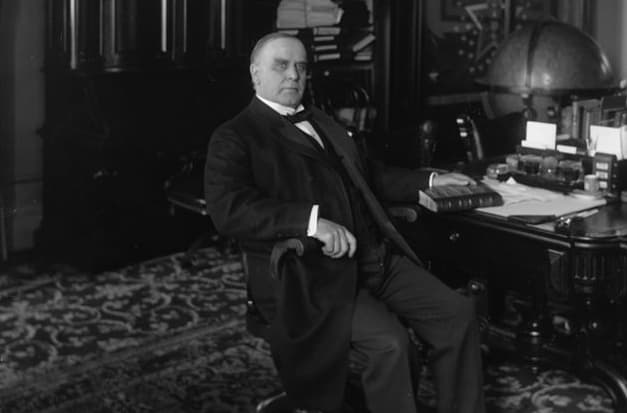Attempt on Trump Recalls the Contrasts With McKinley, Whose Assassination Brought America Together in a Harrowing Moment
Then again, too, no one would have mounted in Central Park a version of ‘Julius Caesar’ in which the dictator who was knifed in the back was Donald Trump.

As President Trump recovers from an assassination attempt, Democrats and anti-Trump Republicans await to learn if the motive of the gunman, Matthew Thomas Crooks, aligned with their politics. What a contrast to yesterday’s America, when unity was a civic virtue and not just a shield invoked when tragedy strikes.
A 19th century German historian, Leopold Von Ranke, once said that we “must resist the temptation to romanticize or idealize the past.” The thought sent me to the Sun’s contemporary coverage after President William McKinley was shot at Buffalo on September 7, 1901, when our scribes found a nation that spoke with respect in peacetime, avoiding the language of violence at all costs.
The day after the anarchist, Leon Czolgosz, shot President McKinley, the reaction was different than yesterday. Republicans would have had a hard time searching for something akin to the 2017 Shakespeare in the Park performance of “Julius Caesar.” That production featured — you guessed it — a Trump-like titular character being stabbed to death.
President Biden has made the claim that Trump is a threat to democracy central to his campaign, but shooting McKinley was seen as just that. While anarchists were assassinating kings, tsars, and queens in Europe, Americans thought it made no sense to slay our president, whom we could vote out of office.
Today, examples are surfacing of Mr. Biden and others making statements against Trump. Just Monday, Mr. Biden told donors, “It’s time to paint a bullseye on Trump,” who he has often called “un-American.” In November, a New York Democrat, Congressman Daniel Goldman, said Trump had to be “eliminated.”
This follows eight years of detractors comparing Trump to Adolf Hitler — number one on every time traveler’s hit list. Unbalanced minds tend to take such statements literally. Had Mr. Biden been targeted after Trump made the “bullseye” remark about him, opponents would be outraged.
Even in the wake of the assassination attempt, a Colorado Democrat, Steven Woodrow, tweeted, “The last thing America needed was sympathy for the devil, but here we are.” After a backlash, he deleted his X account.
McKinley’s assassination occurred before we allowed politicians to carve us up into red and blue teams, making it easier to fundraise and set us upon one another as enemies rather than fellow citizens. In 1901, however, the Sun reserved its condemnation for the assassin, Leon Czolgosz, and the “lunatic fringe.”
That phrase was coined by President Theodore Roosevelt, who acceded to the presidency up McKinley’s death. There was revulsion at the leader of Detroit’s socialists, Michael Meyer, who praised the assassination. It would “scare,” he said, according to the Sun, “the capitalist and labor trusts.”
A man in Meyers’ group greeted the news that McKinley had been shot by saying, “Good,” and was “surrounded and roughly handled.” At Utica, New York, a man expressed similar sentiments and was chased into a police station. Once he sobered up, he “regretted the attempted killing of the president.”
The anarchist leader, Emma Goldman, who Czolgosz said “set me on fire,” was arrested on suspicion of conspiring with him. Having renounced violence, she was later released. She said that, as a nurse, she’d tend to the wounded McKinley.
It’s hard to imagine such an offer from the political fringes for Presidents Biden or Trump today. McKinley, after all, was a unifying figure. Nevertheless, his secretary was uneasy about plans to work the receiving line at Buffalo and urged the president to cancel.
“Why should I?” McKinley asked. “No one would wish to hurt me.” An hour later, Czologsz provided the answer, pumping bullets into his chest and stomach. The president reflected the goodness of his America even then.
As the crowd fell upon Czolgosz, crying, “Lynch him,” McKinley intervened. “Go easy on him, boys,” he said. “Don’t let them hurt him.” This act of mercy saved Czolgosz’s life. He survived to stand trial after McKinley succumbed to his wounds and was executed according to law.
The Sun reported the “terrible event” of bullets tearing into McKinley as an attack on America itself, not the head of the Republican Party. Trump’s opponents are speaking of the attempt on his life as if they believe the same thing, ignoring the mountains of vitriol they’ve heaped upon him.
“There’s no place for this kind of violence in America,” Mr. Biden said. “We must unite as one nation to condemn it.” The words will ring hollow if deeds don’t follow the words and if he fails to take steps to lead the nation back to a time when hateful language and political violence were rejected as un-American at the water’s edge.

